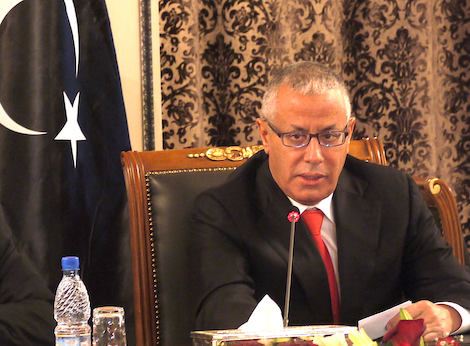By Tom Little.

Tripoli, 19 December:
Prime Minister Ali Zeidan said today, Wednesday, that he had chosen a military governor for the south, . . .[restrict]large swathes of which were declared closed military zones on Monday, although he did name the official.
Zeidan said the government was fully committed to making the south safer, as well as improving the situation in Libya more broadly: “trust me the government will take decisions and execute them”, Zeidan said, “and if we find ourselves incapable we will not continue. But you cannot build a castle in one day. It takes time.”
He announced that troops and warplanes will patrol the area to stop people and arms smuggling across Libya’s borders, saying: “We will not allow our country to be a transit point for these illegal activities.”
This comes one day after Zeidan said Libya’s top priority must be restoring security across the country, especially in the south, as he presented his programme of government to the General National Congress (GNC) in Tripoli yesterday.
Zeidan also explained that the GNC’s decision to close Libya’s borders with its southern neighbours in Sudan, Chad, Niger and Algeria was because of “internal issues” in southern Libya.
He explained that on his visit to the four states last week, he obtained guarantees from security and government officials there that they would monitor their borders with Libya closely and stop any attempts at trafficking goods, weapons or people.
The Prime Minister also revealed that he had secured reassurances from Algeria and Niger that they would keep up close surveillance of their borders with Mali, where Islamist militants currently control the north of the country.
Zeidan said it was key to improve the precarious security situation in southern Libya for stability across the region, emphasising that “Libya is no longer a state that threatens the security of others.”
“We will not be a source of terrorism, a source of violence, a source of bombs any more,” he said.
Zeidan said his government was also taking steps to improve living standards in the south, pointing to the visit of the culture minister to the area last week, where he opened a number of government centres.
In the speech, Zeidan discussed several other key issues and said that the government would submit a request to amend the constitutional declaration, some parts of which had impacted on his government’s ability to work.
The government is still in contact with the Iraq about Libyans currently being held in jails across the country, and Zeidan said that he had recently relayed letters to Nuri Al-Maliki and Jalal Talabani, and thanked them for their cooperation in the matter.
He also voiced his displeasure at a law passed by the GNC recently that made it responsible for appointing Libya’s diplomats.
Zeidan was at pains to stress that “the GNC is a legislative body, and we are an executive body”, and that it was up to his government to appoint diplomatic representatives because “it is not a political post”. [/restrict]







